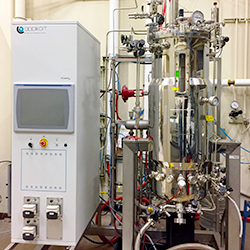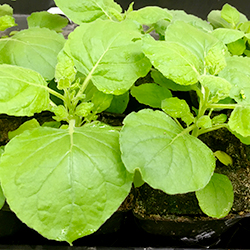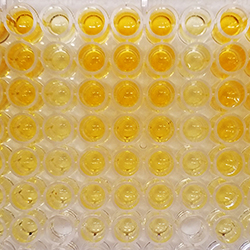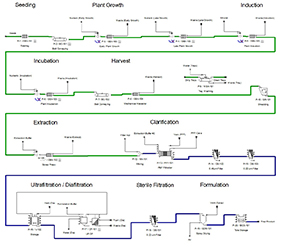In the McDonald/Nandi Lab, our research focuses on using techniques in chemical engineering, plant sciences, and molecular biology to harness plant cells as bioreactors. We utilize Agrobacterium-mediated transformation to genetically engineer plants and plant cell cultures capable of producing molecules of interest. This research has the potential to revolutionize how pharmaceuticals, vaccines, and biofuels are manufactured.
Our current research emphasis is to produce recombinant therapeutic proteins for chemical/biological warefare protection, infectious disease, genetic disorders, and health problems in space. Targets include:
- Alpha-1 Antitrypsin (AAT): Human protease inhibitor valuable in reducing risk for chronic pulmonary disease (COPD).
- Elafin-Fc fusion protein: Human protease inhibitor with anti-inflammatory and anti-bacterial properties.
- CMG2-Fc fusion protein: Bioscavenger protein that acts as a bioshield against anthrax infection.
- Butyrylcholinesterase (BChE): Bioscavenger protein that offers protection from organophosphorus poisoning.
- Parathyroid Hormone (PTH): Endocrine regulator with therapeutic value for osteoporosis and bone-related disease.
Plant Bioreactor Systems
Plant bioreactor systems have the potential to provide significant cost reductions over traditional bioreactor platforms with inherent inability to propagate most mammalian viral contaminants, cheaper and more readily available substrates, and benefits associated with Generally Recognized as Safe organisms.
Molecular Farming
Molecular farming obviates the need for complex upstream facilities, instead enabling low-technology manufacturing to yield substantial product within one week of induction for rapid response medical countermeasures.
Bioanalytics
Production of recombinant proteins in non-native expression hosts (such as plants) necessitates extensive characterization work to confirm the appropriate functionality of the recombinant molecule.
Techno-economic Analysis
Plant-based biomanufacturing is a relatively new platform with a small number of commercial-scale facilities. We use techno-economic models to illustrate platform feasibility and identify promising avenues for the expansion of plant-based production.




